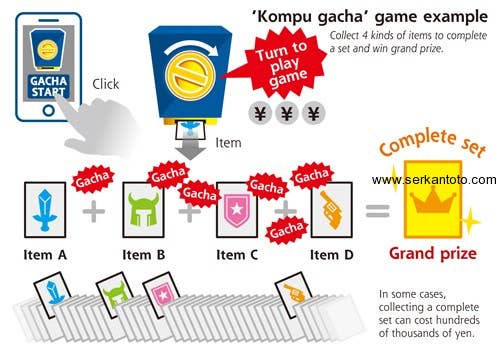Who is responsible for loot boxes?
Voices from around the industry share their thoughts on what's at stake and who should be doing what
Loot boxes are a point of heated debate in the games industry right now. I've shared my own thoughts on the matter, but I've also been recently speaking with other industry-watchers and developers to get a sense of where other people are when it comes to the issue.
One of the first people I ask is Kantan Games' Dr. Serkan Toto because of his familiarity with the Japanese games industry. After all, Japan has been through this debate before. In 2012, the Japanese Consumer Affairs Agency ruled that a game mechanic called kompu gacha (or complete gacha) was illegal. Gacha is similar to standard loot boxes, where players spend money and are given a randomized item. Complete gacha builds a second level onto that, giving players a grand prize if they collect a set of rare items through the normal gacha mechanic.

"The industry didn't implode, but major mobile game developers like GREE and DeNA took major blows from which they never recovered," Toto said. "What is important to note is that until today, the Japanese government specifically targeted kompu gacha and gave 'recommendations' on what mechanics should be banned (there is a list) -- but it technically never regulated the industry to this day. Instead, the ban on kompu gacha was an act of self-regulation from within the Japanese mobile game industry itself."
"I cannot picture a scenario where developers or regulators across China, Korea, Europe or the US will cooperate and enforce loot box regulation"
Dr. Serkan Toto
That could paint a way forward for the industry, as Toto says the industry's curbing of its most aggressive gacha mechanic has allowed the standard gacha to endure while still allowing for developers to experiment with variants.
"Today, gacha are barely subject to any kind of controversy in Japan," Toto says. "Loot boxes are widely accepted by users, developers and the public alike. As long as excesses like kompu gacha continue to be shunned, the mechanic's future should be safe."
That said, he believes any kind of international regulation -- whether coordinated by governments or the industry itself -- is a different matter entirely.
"Most probably, different geographies will continue to treat loot boxes in different ways," Toto says. "I cannot picture a scenario where developers or regulators across China, Korea, Europe or the US will cooperate and enforce loot box regulation."
Wedbush's Michael Pachter tells us he thinks the fears about loot box legislation are overblown.
"Governments can't call it gambling (because the items "won" have no value), but they can legislate and require game publishers to show the odds of receiving each item," Pachter says. "That's about as far as I expect it to go, and I suppose that when players learn that a Ronaldo card in FIFA Ultimate Team is a 1:100 chance, there may be some impact on card sales. However, most people 'get' it and know that nothing is guaranteed."
"It's dumb of the industry to say 'This is wrong' and nothing else"
Michael Pachter
Even if loot boxes were restricted by governments, Pachter believes most games could move over to the season pass model.
"Loot boxes aren't necessary, and I'm confident that if the legislation/regulation is unpalatable, every game will figure out another way to sell in-game items," he says.
However, Pachter doesn't think much of the way some of the big players in the industry have been responding to concerns over loot boxes.
"It's dumb of the industry to say 'This is wrong' and nothing else," Pachter says. "They should be more like [Facebook CEO Mark] Zuckerberg with potential privacy regulation, and say 'Let us work with you to come up with a mutually agreeable solution.'"
Industry consultant Nicholas Lovell has considered the issue at some length, having devoted an entire chapter of his recent book Pyramid of Game Design to ethical design in the modern world.
"I fear we won't [self-regulate], and that government will have to step it"
Nicholas Lovell
"There are only four groups who can change how loot boxes are implemented in games: players, developers, platforms, governments," Lovell tells us. "It's impossible for players to do: while it's easy to say 'vote with your wallets,' egregious abuses can only be addressed by those with power. Developers may by-and-large want to do the right thing, but when there are a million apps on stores, there will some bad actors. I think it is unlikely we can trust developers to solve this issue alone.
"That leaves platforms and regulators. I want the platforms to be the answer. The industry managed to effectively self-regulate over age-ratings, and I would like to see that happen again over loot boxes (which can be a lot of fun). But I fear we won't, and that government will have to step it. They are unlikely to take a nuanced approach and the unintended consequences could be significant."
As the founder and global director of Trend Micro's Internet Safety for Kids & Families program, Lynette Owens gives us a somewhat different view on the issue. In her role, she's been following concerns over the financial manipulation of children since the first wave of lawsuits against Apple from parents upset over children racking up massive bills on free-to-play iPhone and iPad games.
"The thing I think about most with all of these issues -- not just in gaming but also in social networks -- is there's not enough friction in the system," Owens says. "There aren't enough moments to give people pause and say, 'Wait, should I do that? Should I allow my child to do this?' There should be some kind of 'Hey, you've been on this for two hours now,' or 'Hey, you've been spending this much money.'"
"There's not enough friction in the system. There aren't enough moments to give people pause and say, 'Wait, should I do that?'"
Lynette Owens
Owens speaks about "an ethical side to this, a deliberate conscientiousness that needs to go into the design" of such games. At the same time, she readily acknowledges that for children to be financially exploited by these games, parents generally need to buy them the phone or game system they use, attach the account to their credit card, and leave kids to their own devices (or technically the parents' devices, as Owens noted) for this to occur.
One of the big problems she sees is in the feedback (or lack thereof) gaming and tech companies are receiving from their missteps. She points to Facebook's Cambridge Analytica scandal saying it impacted the platform's credibility and the trust people have in it, but it doesn't seem to have stopped people from using it.
"I don't know what it would take to move people," she says. "Because of that disconnect, I wonder if that's the reason we don't see developers or companies really reacting as much or as quickly as we want. They're just looking at numbers and saying, 'Hm, this doesn't really impact us so why should we change?' That's why I think maybe legislation is the answer, because market signals aren't a good motivator right now. Because I do think if Facebook lost 20% of their userbase, they would do something."
Finally, I touch base with Jesse Houston, co-founder and CEO of Phoenix Labs, a rare independent development studio with loot box experience. (The company implemented loot boxes in its cooperative action game Dauntless for a time before dropping them.)
"Right now we don't have any one group taking an unbiased view on loot crates or other game mechanics that should be meant for adult players"
Jesse Houston
"In my opinion, the industry is at a point where we need to regulate the sale and implementation of loot boxes, and that regulation shouldn't be left up to the platforms or the developers," Houston says. "Platforms are not as ubiquitous as we like to think. As an example, Dauntless has been free of platform constraints for the last few years, and millions of players have played and monetized. Also, as game development continues to democratize, the problem of unification gets harder and harder. Folks like Valve, Apple, or Sony will not be equipped to handle all the unique challenges that come up. Also as loot boxes tend to be (when constructed in such a way) very profitable, platform holders are unlikely to take an unbiased view on them.
"A central, focused, regulatory body, like an ESA, ESRB, or PEGI equivalent, will not only prove to the outside world that we're capable of recognizing potential hazards, but importantly show that we are active in the conversation with an eye on the long term. I feel that we're at a growth point where this type of regulation is necessary to best serve our customers and gamers everywhere."
Houston likens it to the fight over video game violence in the early '90s, when a series of US Senate hearings led to the foundation of the Entertainment Software Rating Board.
"This was absolutely necessary as it helped parents and adults understand at a glance what experiences they were opting into," Houston says. "Mortal Kombat being right next to a Mario game on store shelves did not inform parents of the type of game that they were purchasing for their kids. Parents need that information to help shape what they feel is right for their kids. Right now we don't have any one group taking an unbiased view on loot crates or other game mechanics that should be meant for adult players."
Even though Dauntless dropped loot boxes, Houston makes it clear he doesn't have an inherent objection to them; he just wants there to be some guidance and transparency around them. He likened them to trading card games or monthly subscription boxes, saying people enjoy some randomized rewards and adults are responsible for their own behaviors around such things.
"I don't think that loot boxes are inherently bad and mal-intended, but ultimately we, as developers, want to do things that reflect what our players want," Houston says. "We want to offer them fair and transparent ways to reward us with their money because they like the game we've made and the community we've built up around it. I just think we need a bit more perspective and guidance."









